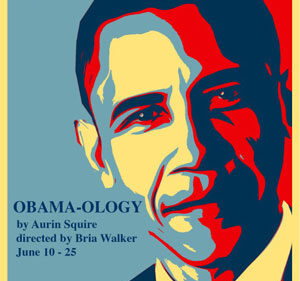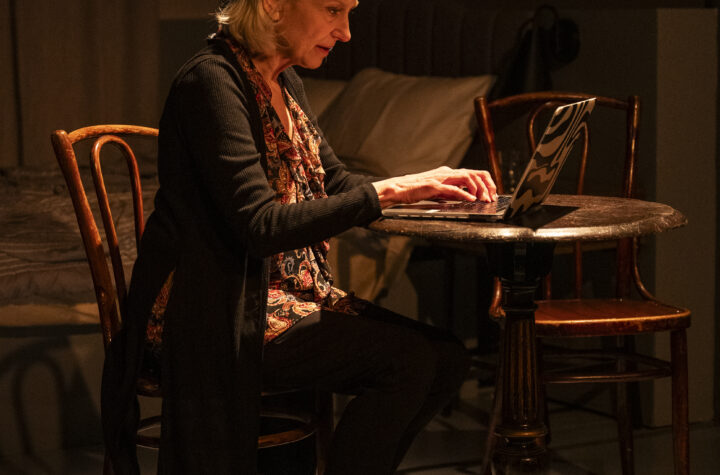
 *** Barack Obama’s 2008 campaign brought together a diverse coalition of people who helped to elect the first black President in our nation’s history and implement the Progressive policies that he stood for. Such is the background of “Obama-ology”, written by Aurin Squire. This four-actor production, directed by Bria Walker, takes place within the context of a small Democratic campaign office in East Cleveland, Ohio. It portrays how Democratic campaign organizers sought to boost voter turnout and interest in the upcoming Presidential election in an economically depressed area that is mostly African American. Enter Warren (David Guiden), a black, college-educated go-getter who is viewed as a promising young figure and thought to be the right person to canvass East Cleveland precincts. But Warren comes from a different socioeconomic background than most people in that community. Having grown up relatively privileged in the New York City area, Warren is in for a rude awakening: He has never had to stare poverty, illiteracy, homelessness, and powerlessness in the face.
*** Barack Obama’s 2008 campaign brought together a diverse coalition of people who helped to elect the first black President in our nation’s history and implement the Progressive policies that he stood for. Such is the background of “Obama-ology”, written by Aurin Squire. This four-actor production, directed by Bria Walker, takes place within the context of a small Democratic campaign office in East Cleveland, Ohio. It portrays how Democratic campaign organizers sought to boost voter turnout and interest in the upcoming Presidential election in an economically depressed area that is mostly African American. Enter Warren (David Guiden), a black, college-educated go-getter who is viewed as a promising young figure and thought to be the right person to canvass East Cleveland precincts. But Warren comes from a different socioeconomic background than most people in that community. Having grown up relatively privileged in the New York City area, Warren is in for a rude awakening: He has never had to stare poverty, illiteracy, homelessness, and powerlessness in the face.
The play is just as much an explicit story about Warren’s work with the Obama campaign as it is an implicit comparison between his life trajectory and that of the former President. By inference, Squire’s script points up that both men came from middle-class families of some economic means. Whereas Obama went to college at Columbia University, Warren has just graduated from Harvard. Although both are well-meaning people, they were quite of out-of-touch in their early twenties when first embarking on a career in community organization. For instance, when Warren started as a campaign worker, he was told that he has to unquestioningly follow the script he was supplied with, that is, in relation to his canvassing and telephone work. But soon he realizes that this approach lacks common sense if he wants to make a point and win other people over to his cause and or call them to action. As one of the campaign organizers tells him, “It is not a matter of learning ebonics but Obama-ology”, and this means communicating in a clear, meaningful, and thoughtful way so as to be effective. It also means listening to what others have to say even if they don’t use the same words as you do. This allows a person to navigate in both the black world and the white world and to learn from everyone from all walks of life.
“This show was intense,” said one audience member as we were leaving the theatre. Most monologues are excellent and acutely perceptive, often describing how racial stereotyping has affected the way that the Democrats got out the black vote in the 2008 election. (Would African Americans vote Democratic no matter what?) Yet, to my mind, other monologues reminded me of preaching to the choir. However, maybe this is important too, as my guest thought that all these speeches taken together were very informative, and she said she learned a lot from the production. She also liked the acting very much and felt it played into the humor, while I thought that some of the acting was amateurish and overdone. The best parts of the show, however, are its serious aspects, such as at the beginning of the second act when we learn more about Warren’s neighborhood recruit Cece and specifically about her handicapped brother. What adds tension to the performance is the traffic stop when Warren and Cece are stopped by the police for “driving while black.” However, I wasn’t happy when Warren puts himself in the shoes of the officer and says to Cece, “He just wants to get home safe tonight too.” This line smacks of idealistic naivete and improbability, especially considering the events of the past decade.
Casting a few more actors to play the various parts would have helped. The other actors in this production are Tuesdai B. Perry, Chris Jensen, and Em Demaio, and they are given the appellations Actor #2, Actor #3, and Actor #4. Yes, we could figure out who was playing whom by viewing minor changes in costumes, observing the way that each of the characters was being addressed, and listening to how they spoke. But the constant rotation of actors playing a multitude of different roles is unnecessary. For example, we should have had a different actor playing the parts of Cece and the lead female campaign worker. Plus, I expected the office workers to wear more gear demonstrating commitment to their cause. Why weren’t the characters wearing Obama ’08 or similar t-shirts—or Obama campaign buttons? Having said that, later on when the same actors play average citizens, they could throw on a sweater or a suit jacket or a dress to cover up this verbiage.
Featured artwork serves as a stage backdrop. Prominently displayed is Shepard Fairey’s iconic poster of Barack Obama with the word “Hope” underneath. There is also a peace symbol, possibly to represent the idealism of the Obama campaign and his support by (white) liberals. Then there are three large abstract panels, the one on the left looking like ocean waves, the one on the right looking like a rising sun: all in variations of red, white, and blue. And most importantly, the one in the center looking like the sun and the moon with a diagonal line between them: probably meant to represent the two “O’s” meeting up with each other, that is, the “O” from Obama’s last name and the State of Ohio, whose state flag contains the letter “O” within it. That said, too much of the set design and prop design is left to the imagination. Some of this works okay, such as we can see the actors sit on stools to represent being on the road in a car. But something craftier would have worked better, especially when it comes to being inside a campaign office. A lot of people in the audience have never seen the inside of one, and there should have been more campaign memorabilia on the stage walls and signs and banners that read “Yes We Can!” and “Sí Se Puede!” I wanted to see Obama bumper stickers and yard signs. I wanted to see at least one telephone on an office desk and lots of notebooks and other props: like junk food lying around and even a microwave oven!
Above all, I wanted the show to generate more energy within me—and stir up the same feelings of solidarity and camaraderie that I once felt when I worked on Obama’s senatorial campaign in 2004 and his Presidential run in 2008—while at the same time pointing up why the election of Barack Obama was especially important to African Americans. The worst flaw in the show, however, is that Guiden, while a very talented actor, is too old to play the part of Warren convincingly.
We see how the campaign workers pull out of East Cleveland after the election is over as they move their operations to some other area of the country. It is not that the Democratic Party and its campaign workers no longer care about these citizens after election day, but it is the Party’s mission to generate the vote in communities where it is deemed to be the most crucial. But Warren’s involvement with the Obama campaign makes a profound impact on him. What he learns about himself is that he has developed an affinity for East Cleveland’s residents and doesn’t want to abandon this neighborhood. Rather, he wants to take the next step and advocate on its behalf, much like President Obama once did when he became a community organizer for South Side residents in Chicago. This show thus becomes a history lesson and a lesson in organizational politics made personal.
“Obama-ology” is playing through June 25, 2023, at the Fleetwood-Jourdain Theatre, located in the Noyes Cultural Arts Center, 927 Noyes Street, in Evanston.
Performance schedule:
Saturdays at 7:00 p.m.
Sundays at 3:00 p.m.
Tickets are $30 and are available for purchase at https://apps.cityofevanston.org/webtrac/wbwsc/webtrac.wsc/search.html?module=PST&display=detail&keyword=FJT.
For more information about this show and to see other offerings by the Fleetwood-Jourdain Theatre, please visit https://www.cityofevanston.org/about-evanston/arts-and-culture/theatre/fleetwood-jourdain-theatre#ad-image-3 or phone 847-866-5914.
To see what others are saying, visit www.theatreinchicago.com, go to Review Round-Up and click at “Obama-ology”.






More Stories
“No Such Thing”
“Dead Man’s Cell Phone”
“the distrikt of lake michigun”